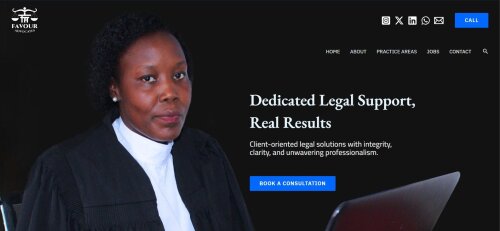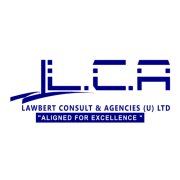Best Estate Planning Lawyers in Kampala
Share your needs with us, get contacted by law firms.
Free. Takes 2 min.
List of the best lawyers in Kampala, Uganda
About Estate Planning Law in Kampala, Uganda
In Kampala, Uganda, and the country at large, Estate Planning law governs the distribution and management of an individual's assets after their death or incapacitation. An effective estate plan ensures that the right beneficiaries receive the assets, be it real estate, savings, or other valuables left by a deceased person. Additionally, it facilitates the provision of health care arrangements in case the person becomes incapacitated.
Why You May Need a Lawyer
Understanding and correctly applying estate laws can be challenging. You may need a lawyer for the following reasons:
1. Drafting your will: To ensure that your assets are distributed as per your intentions after your death, it's essential to draft a will. An experienced attorney can guide you through the legal procedures involved.
2. Settling disputes: If there are disagreements over the distribution of assets, a lawyer can help provide the necessary legal advice and representation.
3. Understanding tax laws: A lawyer can also help you understand Uganda's estate tax laws to prevent your beneficiaries from having to pay excessive taxes.
Local Laws Overview
In Uganda, Estate Planning requires understanding the Succession Act. According to the Act, a person must be at least 21 years old to write a valid will. The law also dictates that the spouse, children, and dependent relatives should be beneficiaries irrespective of the will, unless valid reasons are given otherwise. More complex aspects such as executing a power of attorney or setting up a trust require more in-depth legal knowledge and legal assistance.
Frequently Asked Questions
1. Can I draft my own will without a lawyer?
Yes, you can. However, bear in mind that any misunderstandings or inaccuracies in your will can lead to disputes. A lawyer will ensure that your will abides by all local laws and your intentions.
2. What happens if I die without a will?
If you die "intestate" (without a will), the Uganda Succession Act provides a formula that determines how your estate will be distributed. This typically favors immediate family members but may not align with your wishes.
3. Are there taxes on inheritance in Uganda?
As of now, there's no specific Inheritance Tax in Uganda. However, other forms of tax, such as Stamp Duty or Capital Gains Tax, might apply.
4. Can I disinherit my spouse or children?
Under the Ugandan law, a spouse, children, and dependents have a right to the deceased's estate. You cannot disinherit them without valid reasons.
5. Can wills be contested?
Yes, if beneficiaries or potential heirs believe that the will doesn't reflect the intent of the deceased or if there are suspected errors or omissions, they can contest the will in court.
Additional Resources
The Uganda Law Society (ULS) and Uganda Registration Services Bureau are good starting points for finding legal information or assistance related to Estate Planning. Libraries also typically carry local law books that could provide more insight.
Next Steps
If you need legal assistance in Estate Planning, consider finding a lawyer who specializes in this field. Prepare a list of your assets, your beneficiaries, and any specific wishes you have regarding your estate. Discussing these with your lawyer will facilitate the planning process. Lastly, ensure the completed documents are stored in a safe and accessible location and inform the necessary parties of their existence and location.
Lawzana helps you find the best lawyers and law firms in Kampala through a curated and pre-screened list of qualified legal professionals. Our platform offers rankings and detailed profiles of attorneys and law firms, allowing you to compare based on practice areas, including Estate Planning, experience, and client feedback.
Each profile includes a description of the firm's areas of practice, client reviews, team members and partners, year of establishment, spoken languages, office locations, contact information, social media presence, and any published articles or resources. Most firms on our platform speak English and are experienced in both local and international legal matters.
Get a quote from top-rated law firms in Kampala, Uganda — quickly, securely, and without unnecessary hassle.
Disclaimer:
The information provided on this page is for general informational purposes only and does not constitute legal advice. While we strive to ensure the accuracy and relevance of the content, legal information may change over time, and interpretations of the law can vary. You should always consult with a qualified legal professional for advice specific to your situation.
We disclaim all liability for actions taken or not taken based on the content of this page. If you believe any information is incorrect or outdated, please contact us, and we will review and update it where appropriate.














